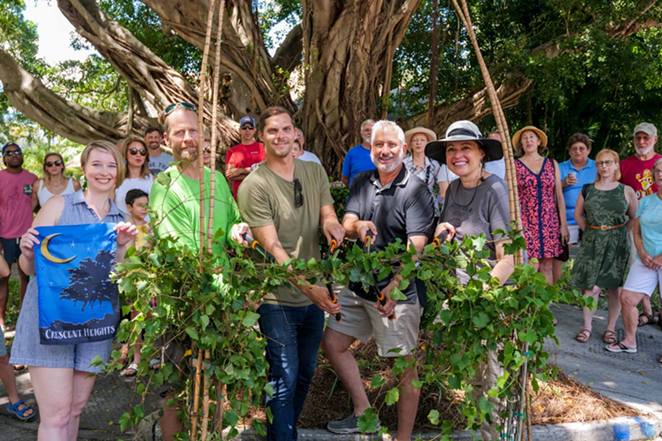
In Thomas Paterek’s backyard, bees and butterflies flit between blue porterweed, crinum lilies and beach creepers. Unlike the typical lawn, his garden fosters Florida natives, and the best part is, it doesn’t need to be watered or pumped with synthetic fertilizers.
Since 2019, the surfer, activist and chair of the local Surfrider Foundation, has been working to harvest these gardens across St. Petersburg. They’re what he calls ocean-friendly gardens. And right now, he says, they're a solution to Florida's ongoing red tide problem.
“We can say a majority of [the red tide] is from corporate polluters, but people can take responsibility for themselves and have an effect on our waterways by using ocean-friendly gardens,” Paterek said. “A good way to start is by doing an analysis of your current living space; to understand that, are these plants that are here native or nonnative, and then the ability to convert those green spaces into Florida native plants so that we don't have to use fertilizer, we can retain more water, we can have healthier waterways.”
Ocean-friendly garden program in the community
Back in 2019, the Surfrider Foundation converted 39 Crescent Heights neighborhood sidewalk plots of turf grass into ocean-friendly gardens, with a $18,000 grant from the city of St. Pete.
Last year, the foundation also planned to install an ocean-friendly garden at a new park near Fifth Avenue N and MLK Jr. Street. With the onset of COVID-19, the project is paused. For now, the foundation is waiting.
“When the park is going to be near its completion phase, and at that point, we'll come in and do that exercise,” Paterek said.
Currently, though, Paterek said he is focusing on community outreach to homeowners, rather than businesses.
“We just feel like we can make a bigger impact when, you know, you get 100 homes to convert their yard versus one business,” he said.
So how does the program work?
According to Arnold Rutkis, Stone Shovel Designs founder and landscape designer, native plants are literally entrenched in our soil, oftentimes with much longer root systems than grass; for example, while turf grass may be six inches deep, the native muhly grass is about six feet deep in the earth.
With deep roots in Florida, native plants absorb more water, which helps prevent water runoff, the number one source of ocean pollution in urban areas and an aggravator of the red tide. They also don’t require fertilizers, so less toxic chemicals flood the oceans.
“A muhly grass or a dune sunflower are going to have very deep roots that can help stabilize soils, and they can also work in soils that are maybe a little more nutrient-poor than say the typical garden plants, and so you don't have to fertilize,” Rutkis said. “The native plants are adapted to our location, our soil types, everything.”
When people replace turf grass with Florida native plants, they create self-sufficient ecosystems. “Some of these plants are a larval host so you have butterflies and moth species that actually [live] on these,” Rutkis said. “So you're creating, you know, multi-dimensional habitat gardens in a very small space.”
As he drives his pickup truck stocked with native plants, Rutkis said pollinators trail the plants and congregate around them. Because native plants attract pollinators, they can sustain themselves.
For Paterek, his ocean-friendly garden doubled in size within just a season.
“It helps a lot with natural pollinators, which helps to flourish the ecosystem and help plants grow,” he said.
Red Tide plans
As St. Pete residents work to reduce fertilizer runoff on an individual scale, Paterek said he wants to see its producers do the same.
“At what point do we actually put an action plan together to close Piney Point so this doesn't happen again, and then have you look at the 27 other gypsum stacks in the state of Florida and say, ‘Hey what's going on here, what are we going to do to mitigate this because this is a statewide issue,'” he said.
After all, Paterek points to phosphate, which manufactures fertilizer, as the cause for the worsening of the algal blooms.
“When you put gasoline on fire, it gets out of control,” he said, “so harmful algal blooms are like fire, and humans, producing phosphate and other things that feed these algal blooms is like our gasoline.”
St. Pete Mayor Rick Kriseman agreed. “You know, red tide has been going on for a long time but fertilizer, that contributes to red tide,” he said in a Café Con Tampa meeting on Aug. 30. “Certainly what happened at Piney Point. I’m not a scientist, but I believe that it supercharged red tide, and if those things had been addressed, the significance of the red tide that we’ve experienced might not have been anything like what it was.”
Paterek is also organizing local rallies. On July 17, around 400 locals concerned about the red tide marched along the St. Pete Pier, demanding action.
Because when they rally, Paterek said, they speak for the voiceless: the communities impacted and the millions of tons of dead sea life.
“That's how change happens when a collective voice gets together and tells the people that we hired as politicians, who they need to listen to,” he said. “There is strength in numbers, and the louder our voices get, our politicians who we put into power have to listen to us. And when they don't listen to us, then you know what happens? We fire them, and we get rid of them, and we get someone who's more supportive of what the right thing is for our Florida waterways.”
Send anonymous news tips to [email protected]. Support local journalism in these crazy days. Our small but mighty team works tirelessly to bring you news on how coronavirus is affecting Tampa and surrounding areas. Please consider making a one time or monthly donation to help support our staff. Every little bit helps.
Subscribe to our newsletter and follow @cl_tampabay on Twitter.
















